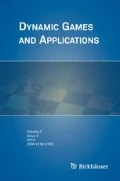Abstract
It is generally admitted that a correct forecasting of uncertain variables needs Markov decision rules. In a dynamic game environment, this belief is reinforced if one focuses on credible actions of the players. Usually, subgame perfectness requires equilibrium strategies to be constructed on Markov rules. It comes as a surprise that there are interesting classes of stochastic differential games where the equilibrium based on open-loop strategies is subgame perfect. This fact is well known for deterministic games. We explore here the stochastic case, not dealt with up to now, identifying different game structures leading to the subgame perfectness of the open-loop equilibrium.
Similar content being viewed by others
Notes
The results shown in the paper remain valid for a variable discount factor \(\mathrm{e}^{-\int _t^s \rho ^i(r) \mathrm{d}r}\), where \(\rho ^i(r)\ge 0\) is a continuous function. The changes in the equations shown in the paper are straightforward.
If no bequest function is imposed, then the extraction rate equilibrium becomes unbounded at the terminal time. The model is similar to that studied in Reinganum and Stokey [14]. Uncertainty does not mitigate the problem.
References
Başar T, Olsder GJ (1999) Dynamic noncooperative game theory. Classics in applied mathematics. SIAM, Philadelphia
Clemhout S, Wan HY Jr (1974) A class of trilinear differential games. J Optim Theory Appl 14(4):419–424
Dockner E, Feichtinger G, Jørgensen S (1985) Tractable classes of nonzero-sum open-loop Nash differential games: theory and examples. J Optim Theory Appl 45(2):179–197
Dockner EJ, Jørgensen S, Van Long N, Sorger G (2000) Differential games in economics and management science. Cambridge University Press, New York
Fershtman C (1987) Identification of classes of differential games for which the open loop is a degenerate feedback nash equilibrium. J Optim Theory Appl 55(2):217–231
Fershtman C (1989) Fixed rules and decision rules: time consistency and subgame perfection. Econ Lett 30(3):191–194
Fleming WH, Rishel RW (1975) Deterministic and stochastic optimal control. Springer, New York
Jørgensen S (1985) An exponential differential game which admits a simple Nash solution. J Optim Theory Appl 45(3):383–396
Jørgensen S, Martín-Herrán G, Zaccour G (2003) Agreeability and time consistency in linear-state differential games. J Optim Theory Appl 119(1):49–63
Jørgensen S, Martín-Herrán G, Zaccour G (2010) The Leitmann–Schmitendorf advertising differential game. Appl Math Comput 217(3):1110–1116
Kamien MI, Schwartz NL (1991) Dynamic optimization: the calculus of variations and optimal control in economics and management, 2nd edn. North-Holland, Amsterdam
Mehlmann A (1988) Applied differential games. Plenum Press, New York
Reinganum JF (1981) Dynamic games of innovation. J Econ Theory 25(1):21–41
Reinganum JF, Stokey N (1985) Oligopoly extraction of a common property natural resource: the importance of the period of commitment in dynamic games. Int Econ Rev 26(1):161–173
Yeung DWK (2001) Infinite-horizon stochastic differential games with branching payoffs. J Optim Theory Appl 111(2):445–460
Acknowledgements
We gratefully acknowledge the constructive comments of two anonymous referees and the associate editor. Support from the Ministerio de Economía y Competitividad (Spain), grants ECO 2014-56384-P, MDM 2014-0431, and Comunidad de Madrid, MadEco-CM S2015/HUM-3444 is gratefully acknowledged.
Author information
Authors and Affiliations
Corresponding author
Rights and permissions
About this article
Cite this article
Josa-Fombellida, R., Rincón-Zapatero, J.P. Stochastic Differential Games for Which the Open-Loop Equilibrium is Subgame Perfect. Dyn Games Appl 8, 379–400 (2018). https://doi.org/10.1007/s13235-017-0221-y
Published:
Issue Date:
DOI: https://doi.org/10.1007/s13235-017-0221-y




